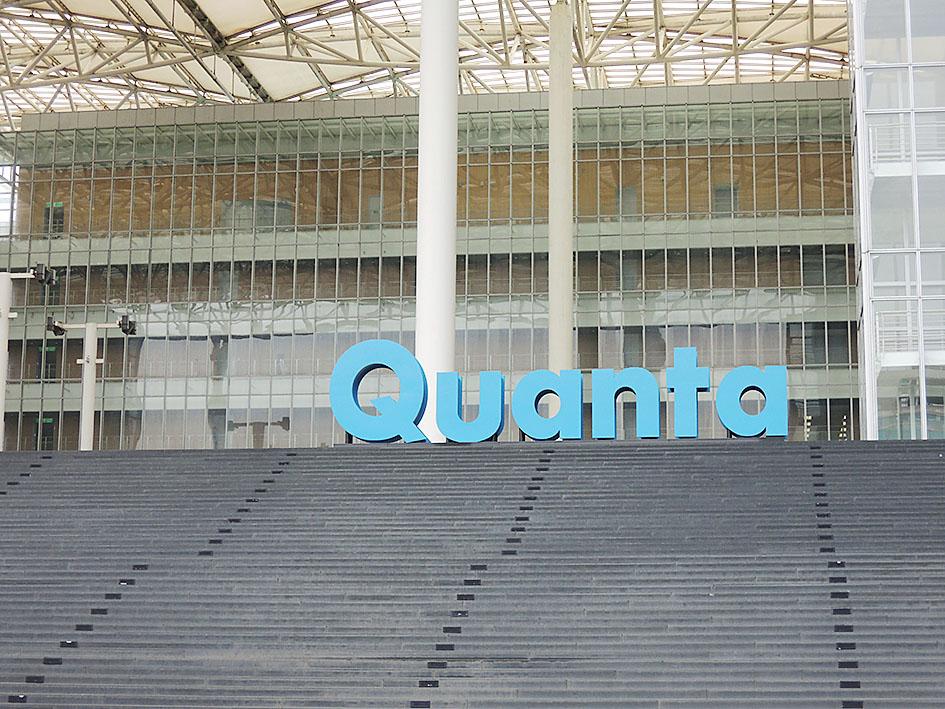Quanta Computer Inc (廣達電腦), one of the world’s leading contract notebook computer makers, yesterday reported strong profit for the first quarter, but added that a severe shortage of key components could affect its business.
“Our growth could be limited by a shortage of components,” Quanta spokesman Elton Yang (楊俊烈) told an online investors’ conference.
“The situation is severe, and it is hard to calculate how short we are,” Yang added.

Photo: Vanessa Cho, Taipei Times
Revenue growth this quarter would be limited to single-digit percentage sequential growth due to the shortage, but the company would fight to keep up with surging demand, he said.
With good order visibility extending into the third quarter, the outlook for the second half of the year is better than for the first half, he said.
“There would be no problem with demand for laptops in 2021,” Yang said.
Laptop demand remains robust even as the COVID-19 pandemic eases with nations introducing vaccination programs, but shortages of key components, including display panels and graphics cards, have had a knock-on effect, causing a laptop shortage.
Last year, Quanta shipped a record 59.8 million laptops, up 70 percent from a year earlier.
Shipments in the first quarter of this year totaled 19 million units, down 700,000 units from a year earlier, company data showed.
Quanta posted a net profit of NT$7.1 billion (US$253.6 million) in the first quarter, down 17.72 percent quarter-on-quarter, but up 175.18 percent year-on-year.
Earnings per share were NT$1.84, a new record for the first quarter.
Revenue in the first quarter was NT$268.95 billion, down 11.25 percent quarter-on-quarter, but up 41.33 percent year-on-year.
Gross margin was 6.33 percent, up 0.13 percentage points from a quarter earlier and 1.48 percentage points from the same period last year, the company said.

CHIP WAR: Tariffs on Taiwanese chips would prompt companies to move their factories, but not necessarily to the US, unleashing a ‘global cross-sector tariff war’ US President Donald Trump would “shoot himself in the foot” if he follows through on his recent pledge to impose higher tariffs on Taiwanese and other foreign semiconductors entering the US, analysts said. Trump’s plans to raise tariffs on chips manufactured in Taiwan to as high as 100 percent would backfire, macroeconomist Henry Wu (吳嘉隆) said. He would “shoot himself in the foot,” Wu said on Saturday, as such economic measures would lead Taiwanese chip suppliers to pass on additional costs to their US clients and consumers, and ultimately cause another wave of inflation. Trump has claimed that Taiwan took up to

A start-up in Mexico is trying to help get a handle on one coastal city’s plastic waste problem by converting it into gasoline, diesel and other fuels. With less than 10 percent of the world’s plastics being recycled, Petgas’ idea is that rather than letting discarded plastic become waste, it can become productive again as fuel. Petgas developed a machine in the port city of Boca del Rio that uses pyrolysis, a thermodynamic process that heats plastics in the absence of oxygen, breaking it down to produce gasoline, diesel, kerosene, paraffin and coke. Petgas chief technology officer Carlos Parraguirre Diaz said that in

SUPPORT: The government said it would help firms deal with supply disruptions, after Trump signed orders imposing tariffs of 25 percent on imports from Canada and Mexico The government pledged to help companies with operations in Mexico, such as iPhone assembler Hon Hai Precision Industry Co (鴻海精密), also known as Foxconn Technology Group (富士康科技集團), shift production lines and investment if needed to deal with higher US tariffs. The Ministry of Economic Affairs yesterday announced measures to help local firms cope with the US tariff increases on Canada, Mexico, China and other potential areas. The ministry said that it would establish an investment and trade service center in the US to help Taiwanese firms assess the investment environment in different US states, plan supply chain relocation strategies and

Japan intends to closely monitor the impact on its currency of US President Donald Trump’s new tariffs and is worried about the international fallout from the trade imposts, Japanese Minister of Finance Katsunobu Kato said. “We need to carefully see how the exchange rate and other factors will be affected and what form US monetary policy will take in the future,” Kato said yesterday in an interview with Fuji Television. Japan is very concerned about how the tariffs might impact the global economy, he added. Kato spoke as nations and firms brace for potential repercussions after Trump unleashed the first salvo of